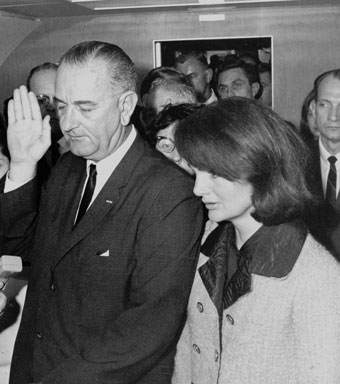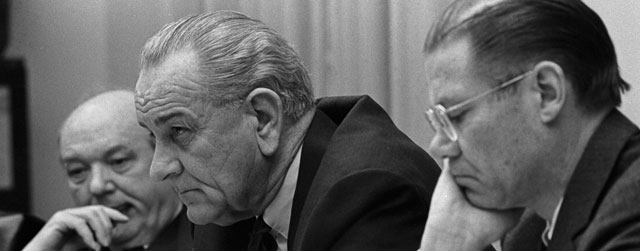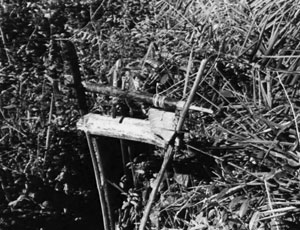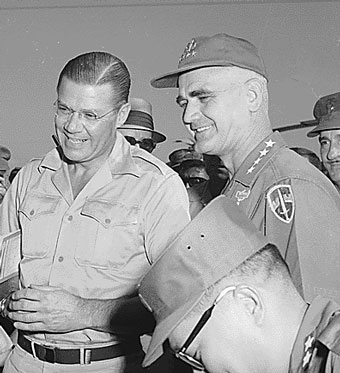The Johnson transition
The question of what to do in Vietnam was far from answered when Lyndon Johnson suddenly became president

At 2:38 p.m. Central Time on November 22, 1963, Lyndon Johnson became president of the United States. Standing aboard Air Force One as it sat on the tarmac of Dallas’s Love Field, a stunned and blood-spattered Jacqueline Kennedy to his left, the Texan raised his right hand and assumed the leadership of a nation in shock.
Johnson had felt sidelined for much of his vice presidency; now the major decisions were his. But with all the challenges he faced, could the new president have had any inkling that a small, divided country in Southeast Asia would come to define much of his time in the White House and force him out of the office he had sought for nearly his entire life?
A WAR INHERITED
Johnson’s first pronouncement as president was that he would continue the policies of his predecessor, particularly in the fields of economic policy and civil rights. But LBJ was equally committed to winning the fight against the Communist insurgency in Vietnam. “This nation will keep its commitments from South Vietnam to West Berlin,” he told a joint session of Congress on November 27.
In private, the new president was far less certain. Five days after his public address, Johnson discussed Vietnam with Senator J. William Fulbright (D-AK), framing the issue as a binary choice: "getting in or getting out."
[transcript here]
Johnson was quite aware that he wasn't starting with a blank slate. Presidents Harry S. Truman and Dwight D. Eisenhower had committed significant American resources to counter the Communist-led Viet Minh in its struggle against France following World War II. Kennedy had deepened and expanded that commitment, increasing the number of US military advisors in Vietnam from just under 700 in 1961 to more than 16,000 by the fall of 1963. Kennedy’s largesse also extended to the broader provision of foreign aid.
Men and money, however, contributed neither to greater success in the counterinsurgency nor to the stabilization of South Vietnamese politics. Charges of corruption had dogged the government of South Vietnamese President Ngo Dinh Diem for years, sparking public condemnation of his rule. Eventually Diem was killed in a coup that brought a military junta to power just 21 days before Kennedy’s own assassination.
DEFINING VICTORY
I am not going to lose Vietnam. I am not going to be the president who saw Southeast Asia go the way China went.
Johnson vowed not to lose the war. "I am not going to lose Vietnam," he told the ambassador to South Vietnam, Henry Cabot Lodge Jr., two days after assuming office. "I am not going to be the president who saw Southeast Asia go the way China went."
Uncertain of his own foreign-policy credentials, he relied heavily on figures such as Secretary of Defense Robert S. McNamara, Secretary of State Dean Rusk, and National Security Advisor McGeorge Bundy—Kennedy men all. “I need you more than he did,” LBJ said to his national security team, and he encouraged them to work even harder at helping South Vietnam defeat the Communists.

The first challenge was confronting a wave of instability following the Diem coup, which Communist forces were only too eager to exploit. Raids by the local Communists—dubbed the Viet Cong, or VC, by Diem—had picked up in frequency and intensity in the weeks following the coup. All signs were now pointing to a situation worse than the one Kennedy had confronted.

Or so it seemed. Compounding the new administration’s problems was the realization that previous assessments of progress in the war were suspect. Even though State Department officials had pointed to mounting troubles against the Viet Cong in October 1963, Pentagon officials—both civilian and military—had rejected those arguments. By December, with attacks increasing in the countryside, a look back at those earlier metrics revealed that State Department analyses were indeed on the mark.
Johnson did not need that retrospective appraisal to launch a more vigorous campaign against the Communists—his first impulse was to shift the war into higher gear. Meeting with his top civilian advisors on Vietnam, LBJ told them to forget about the social, economic, and political reforms that Kennedy had stressed. Victory in the military conflict was his top priority. Hoping to apply more pressure on the Communists, the administration began to implement a more aggressive propaganda offensive as well as sabotage directed against North Vietnam.
But those enhanced measures were unable to force a change in Hanoi or to stabilize the political scene in Saigon, and in late January 1964, General Nguyen Khanh overthrew the ruling junta. Washington was generally pleased with the turn of events and sought to bolster the Khanh regime, but officials remained dissatisfied with progress in the counterinsurgency.
In this series of conversations, beginning with a February 3 discussion with newspaper baron John Knight, LBJ offers an assessment of his current options—none of which were good.
[Transcript here]
[Transcript here]
[Transcript here]
[Transcript here]
Secretary of Defense McNamara returned from a March 1964 fact-finding mission to Vietnam with more discouraging news: Signs pointed to a deterioration in South Vietnamese morale and increased Communist success. McNamara recommended a more vigorous program of US military and economic support for South Vietnam.
[Transcript here]

Over the course of the next several months, American assistance to South Vietnam would play out against a backdrop of personnel changes and political jockeying at home and in Saigon.
In June, Henry Cabot Lodge resigned as ambassador to South Vietnam to oppose eventual Republican presidential nominee Barry Goldwater. His replacement was retired Army General Maxwell Taylor, formerly the chairman of the Joint Chiefs of Staff—a signal that the United States was becoming deeply invested in the military outcome of the conflict. General Paul D. Harkins left his post as head of the US Military Assistance Command, Vietnam (MACV). He was replaced by Lieutenant General William C. Westmoreland, Harkins’ deputy since January 1964, a man McNamara called “the best in the Army for it, without question.”
[Transcript here]
By late May, Johnson and his advisers were confronting the need for decisive action. But the president still had his doubts. On the morning of May 27, 1964, he placed a call to his friend, mentor, and sometime antagonist Senator Richard Russell of Georgia. "I've got lots of troubles," LBJ began, revealing his deeply conflicted thinking on Vietnam and a profound sense of anxiety absent from his public remarks on the subject.
As the spring turned to summer, Johnson was focused on November and the chance to win the presidency in his own right. He was still working to enhance his record with legislation on civil rights and war on poverty. In Vietnam, there were political risks in both increased intervention and restraint. "America keeps her word," he said in a June press conference. "Our purpose is peace."
At the same time, the US military began developing plans for more aggressive action against both Viet Cong insurgents and North Vietnam. After an "incident" the Tonkin Gulf on August 4, they would have the chance to implement them.